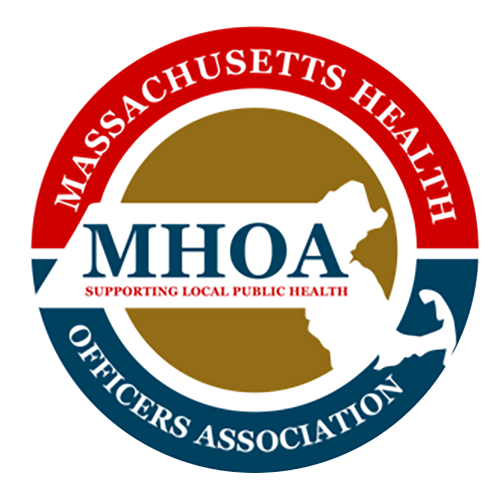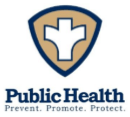Complete Story
01/21/2021
MHOA Spotlight – Amy-Donovan Palmer
By Abby Faria
By Abby Faria
Amy-Donovan Palmer currently serves as the Health Director for the town of Mansfield, MA. Prior to the COVID-19 pandemic, her work within the department consisted of efforts around food safety, septic, housing, schools, summer camp facilities, and more. The Mansfield Public Health Department contracts with external groups to help complete their work because Dir. Donovan-Palmer is the only health agent in the town’s department. Dir. Donovan-Palmer receives help from her administrative assistant and remarks that she feels very supported and appreciated by the town.
Dir. Donovan-Palmer was drawn to public health once she started working in a nutrition department laboratory at the Harvard T.H. Chan School of Public Health. Initially, she had an affinity for environmental issues. During her time studying environmental science at UMass Amherst, she developed an interest in local wastewater treatment issues. She worked in the residuals department at the Massachusetts Water Resource Authority, then moved onto another job before eventually winding up in the lab at Harvard. “It wasn’t necessarily that I liked nutrition or public health, but knew how to work in the lab,” she says. Around the same time, Dir. Donovan-Palmer started volunteering in the kitchen at Rosie’s Place women’s shelter in Boston.
Dir. Donovan-Palmer found Boston University’s program in urban environmental health and its emphasis on poverty disparities to be very interesting since she had exposure to the needs of the impoverished in Boston through her work at Rosie’s Place, so she began taking classes part-time while still working at Harvard. She was “especially interested in seeing how environments can affect people’s lives and health.” She mentioned the Black Lives Matter movement, saying that “Black Lives Matter is at the public health level as it is at every other level…I think public health needs to look really closely at what we need to do for people of color and we can see that with pandemic as people are disproportionately affected by this virus.” Reflecting on the process of finding her passion in public health, she says “I never knew where public health was going to take me and that’s the great thing about the field.”
Before taking on her current position, Dir. Donovan-Palmer worked in emergency preparation planning in Bristol County and in wastewater management. Dir. Donovan-Palmer was very interested in local issues, so she eventually made the switch from working in emergency preparedness planning to working in a local board of health “so that I could do more hands-on work.” She explains how the COVID-19 pandemic has really highlighted how local health boards handle just about everything when it comes to public health issues, and this really “keeps you on your toes.” Some of her favorite aspects of her job include that there is a variety of work for her. “There have been several times where an issue has come up and I’ve said ‘Oh, that’s my job?’…The variety changes.”
During the beginning of the COVID-19 pandemic, Dir. Donovan-Palmer quickly found that she had even more work on her plate than she was accustomed to. “Local public health is managing everything with the pandemic,” she says. Her department made a recent switch from using a Visiting Nurse Association (VNA) to the town Emergency Management Services (EMS) for public health nursing. This was a big change because it allowed for the expansion of their public health nursing services. Dir. Donovan-Palmer feels they are “very fortunate” to have made this switch about a year and a half ago before the pandemic began, since the public health nursing services have become even more important. The town also recently promoted a new fire chief which has been significant for Dir. Donovan-Palmer because she works very closely with him as he helps with COVID-19 contact tracing.
Dir. Donovan-Palmer says that working with MHOA has been “instrumental” throughout her career. MHOA has helped connect her to the Academic Public Health Volunteer Corps (APHVC) and these students helped create infographics about COVID-19 safety for her community. She finds that MHOA’s conferences and trainings have been especially useful for herself and others. “I think with MHOA, the most important thing is advocating for local public health funding, trainings, and a forum for us to get to meet other health agents and exchange ideas – that’s been a huge help for me…One thing I love about local public health is that everyone shares.” Collaboration occurs despite the fractured structure of the state’s health department. This structure causes each town’s health department to operate as its own entity, which gives them more leeway to form processes for licensing businesses. However, she appreciates that this helps local health workers like herself to form relationships with business owners in their community. Despite how towns tend to operate independently of each other, she explains how the Nashoba Valley and Franklin County health departments have been working closely together, and “this is a good model for us to look towards.”
Reflecting on how MHOA encourages collaboration, Dir. Donovan-Palmer recalls that a conference connected her with leaders in the surrounding towns of Norton and Foxboro to talk about regionalization. She hopes that with the grant they’ve recently received, they can “set up a model for the three towns, and hopefully show the rest of the state” how towns can collaborate on shared goals.
To Dir. Donovan-Palmer, working in local public health is “so important and fulfilling.”
She finds it can be difficult to advocate for themselves as much of the work is very future-thinking and “if we’re doing our job, no one thinks about us.” She recalls how even at the beginning of the pandemic, a meme went around on social media depicting the important roles of essential workers, from trash collector to grocery workers, but didn’t list public health. However, she hopes and believes that the COVID-19 pandemic will continue to bring more visibility to local public health work, and that local- and state-level public health “will be recognized for the work that we do, and not just pandemic-related.”
Outside of work, Dir. Donovan-Palmer loves spending time with her family, and spends most of her free time with them. She also enjoys running. Dir. Donovan-Palmer appreciates groups that are advocating for more funding for local public health. “We have to work on promoting ourselves and advocating, but as a culture we tend to do the work we do with our heads down.”


